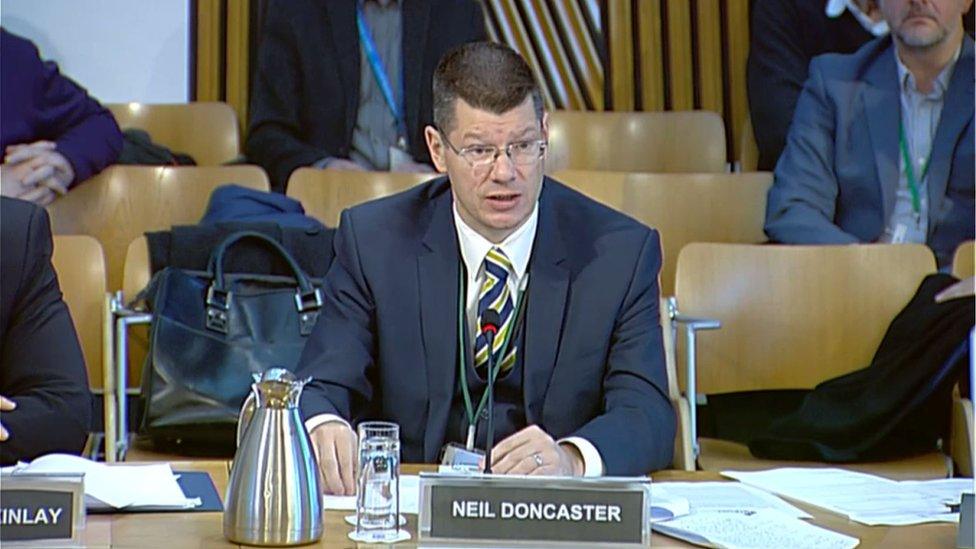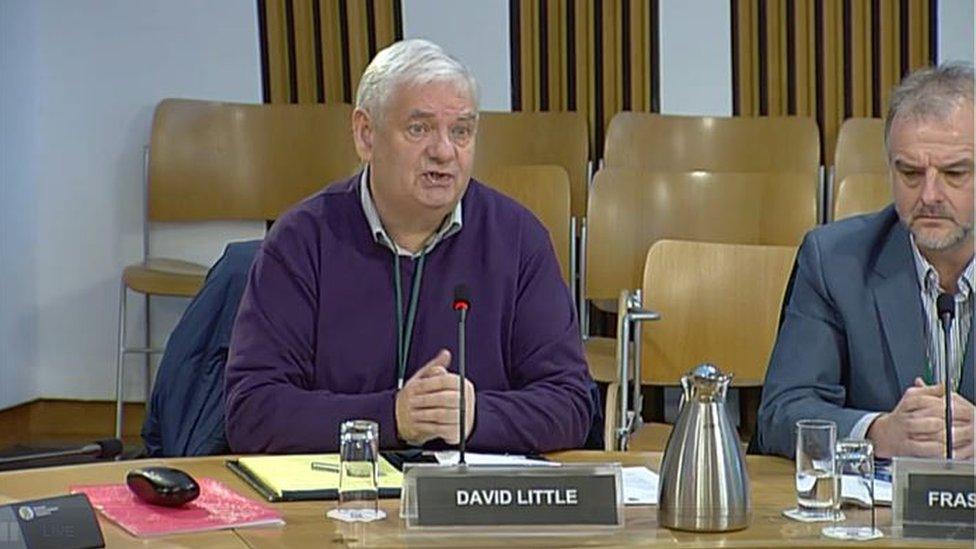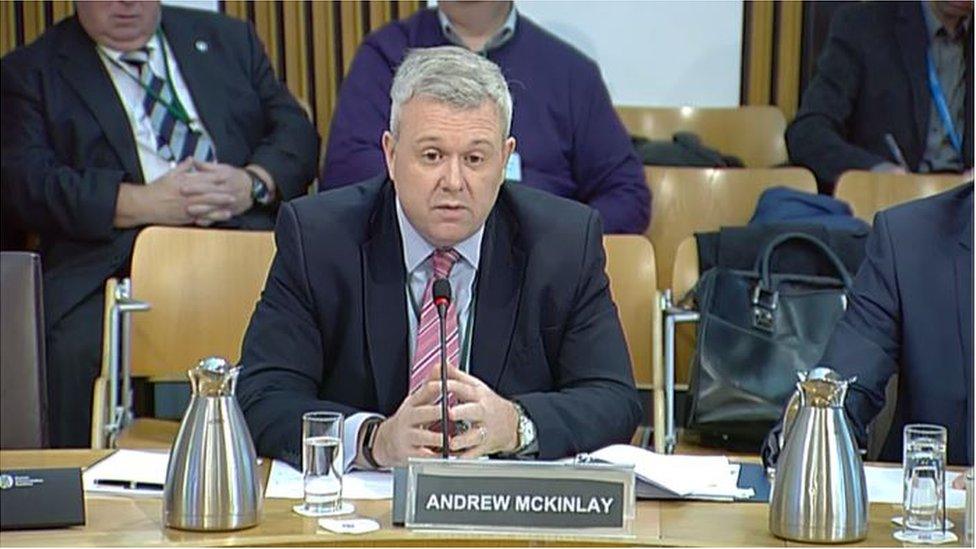'Serious concerns' over Scottish youth football system
- Published

SPFL chief executive Neil Doncaster said the current system "strikes the appropriate balance"
MSPs have voiced "serious concerns" over contracts and agents in Scotland's youth football system.
Holyrood's public petitions committee questioned football chiefs over claims under-16 players had been paid £1 a week, and heard there were no background checks for player agents.
SPFL boss Neil Doncaster insisted the current system "strikes the appropriate balance" to protect clubs and players.
But MSPs said they were "horrified" and "seriously concerned" by the evidence.
The committee was examining a petition, external calling for an investigation into the "appropriateness" of professional football clubs entering into contracts with children under the age of 16, and charging compensation payments for their transfer between clubs.
MSPs questioned whether clubs were essentially treating children as commodities.
'Auctioning a child'
David Little, of the Scottish Youth Football Association, recounted an incident where two clubs became involved in a "bidding war" over a youth player, up to the value of £30,000.
Mr Little said this practice should be "eliminated", adding: "We shouldn't have an auction of a child."
Fraser Wishart, of the Professional Footballers' Association Scotland, said "there must be an alternative" to compensation schemes, saying the system should not block a 14-year-old from changing club.
The issue of wages was also raised, with Mr Wishart saying that some clubs paid young players as little as £1 a week, which he called "unacceptable".

David Little said there had been "bidding wars" over young players which boiled down to "an auction of a child"
He also raised concerns about under-16 players having agents, a practice he said should not exist at all - and revealed a lack of disclosures and background checks on agents.
He said: "They are allowed to sign representation contracts of sorts with minors so an 11 or 12-year-old lad with a guardian's approval can sign a contract for an intermediary to represent him at that age. Why you need somebody to represent you at that age I don't know.
"In terms of the welfare of young people, I think there should be greater checks of any intermediary that's going to interact with young people."
SNP MSP James Dornan said he was "horrified" to hear about this, saying there seemed to be a "total disregard" for the welfare of children in football.
Roderick Houston, of the Scottish Schools' Football Association, agreed that he was "profoundly concerned" about agents. He said it was "completely inappropriate" for under-16s to have agents, but said some parents felt "intimidated" by clubs and believed they needed representation.
Committee convener Johann Lamont said it seemed like clubs were using the dream of being a footballer to make young people "work against their own interests" in a case of "simple exploitation".
'Illegal' contracts
A later session was held with bosses from the Scottish Football Association (SFA) and the Scottish Professional Football League (SPFL), who defended the system.
Under questioning from Ms Lamont, SFA Director of Football Governance and Regulation Andrew McKinlay admitted that the body could end up registering an "illegal" contract, as it does not look at the terms of each of the thousands submitted.
He said there were "no immediate plans to change" the system, with with SPFL chief executive Mr Doncaster adding that "we are not a police force".
Mr Doncaster said the body would "investigate fully" when concerns about wages were raised, repeating: "Be in no doubt, all clubs are bound by national minimum wage legislation."

Andrew McKinlay said the issue of background checks on agents may come up in the forthcoming abuse inquiry
However, Mr Doncaster said the current system of compensation payments "strikes the appropriate balance", as it needs to protect clubs as well as young people.
He said there had to be incentive for clubs to put time and money into developing young players, who could potentially be "hoovered up" by richer clubs.
Mr Doncaster said it was "appropriate that we have a balanced system which incentivises clubs to invest" while respecting the rights of the child, repeatedly describing the system as "fair".
Mr McKinlay said it was difficult having the big-money English leagues just across the border, saying English clubs could afford to "take a punt" on young Scottish players.
Asked about the lack of disclosure checks on agents working with young people, Mr McKinlay said the issue may form part of the upcoming inquiry into child abuse in football.
He said there is a self-disclosure system, but agreed it was "an area we need to look at to see if there's more we can do".
'Deeply concerning'
MSPs voiced concerns about many parts of the evidence heard.
Conservative MSP Brian Whittle said it was "absurd" and "insane" that people could talk about agents and contracts and compensation while dealing with children.
He told Mr Doncaster: "I find it incredible. We're dealing with kids here. I can't get my head around the fact you're defending this system."
Fellow Tory Maurice Corry said he was "really quite seriously concerned" about the submissions from the SFA and SPFL, questioning whether they were working to prevent exploitation.
Mr Dornan said the system for contracts appeared to be "one big rubber stamp". After he pressed Mr McKinlay on the compensation that "trickles down" to youth teams, the SFA executive said it could amount to "a bag of balls".
Following the session, Ms Lamont said: "Today we heard deeply-concerning evidence from the SFA and SPFL.
"We are dealing with a child welfare issue and there are strong concerns that the key issue of how children's rights are protected, while sustainably growing their talent, is not yet being adequately addressed.
"The SFA and SPFL have suggested improvements in the youth football system, but in the view of the petitioner and this committee, these simply don't go far enough."
- Published13 December 2016

- Attribution
- Published14 June 2016
